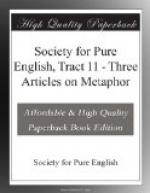The word is no doubt abused and intrudes everywhere. The Times writes of a recent gale, Considerable damage was done by the gale in practically every parish in Jersey, and again of a bridge on the Seine that The structure has practically been swept away; but it seems that in the sense of ‘for practical purposes’ it can be defended as a useful word. For instance, a friend, leaving your house at night to walk home, says, It is full moon, isn’t it? and you reply Practically, meaning that it is full enough for his purpose. You might say nearabouts or thereabouts or sufficiently, but you cannot say almost or nearly without implying that you know the full moon to be nearly due and not past. In such cases it might be argued that ‘practically’ is truly opposed to ‘theoretically’, but ‘actually’ is rather its opposite. ‘Practically’ implies an undefined margin of error which does not affect the situation.
LITERALLY
A correspondent quotes: For the last three years I literally coined money, and, My hair literally stood on end. The common misuse of this word is so absurd that it would not be worth while to protest against it, if its daily appearance in every newspaper did not show that it was tolerated by educated people. Mr. Fowler writes:
’We have come to such a pass with this emphasizer that where the truth would require us to acknowledge our exaggeration with, “not literally, of course, but in a manner of speaking”, we do not hesitate to insert the very word that we ought to be at pains to repudiate; such false coin makes honest traffic in words impossible. If the Home Rule Bill is passed, the 300,000 Unionists of the South and West of Ireland will be literally thrown to the wolves. The strong “tête-de-pont” fortifications were rushed by our troops, and a battalion crossed the bridge literally on the enemy’s shoulders. In both, practically or virtually, opposites of literally, would have stood.’
INFINITELY
This word, like infiniment in French, is commonly used for ‘extremely’, and it is pedantic to object to it by insisting always on its full logical meaning; but it should be avoided where measurable quantities are spoken of; for instance, one may say to indoctrinate the mob with philosophical notions does infinite harm, but to say that England is infinitely more populous than Australia is absurd. That one can rightly call atoms infinitely small means that they are to our senses immeasurable, and the word, as it here carries wonder, may, like other conversational expletives, have an emotional force, and can therefore be sometimes well used even where its exaggeration is apparent. As when a man heightens some assertion with a ‘damnable,’ he intends by the colour of his speech to warn you that his conviction is profound, and that he is in no mood to listen to reason, so the exaggeration of ‘infinite’ may have special value by giving emotional colour to a sentence.




